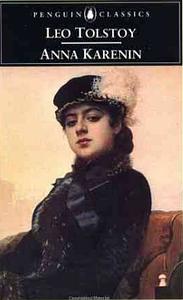Take a photo of a barcode or cover
Well this was a battle I had almost lost.
Anna Karenina is a very character driven story. Not much happens, but what goes on in the minds of the characters is important. Each and every character is well formed, no one is left in the background to be forgotten.
Anna is such a complex and difficult character, you cannot predict what she will say or do. Levin is my new big love, a man too proud at some time, but willing to leave it at the door sometimes so he can find happiness.
Dear Anna Karenina,
Teach me how to love with such passion.
Anna Karenina is a very character driven story. Not much happens, but what goes on in the minds of the characters is important. Each and every character is well formed, no one is left in the background to be forgotten.
Anna is such a complex and difficult character, you cannot predict what she will say or do. Levin is my new big love, a man too proud at some time, but willing to leave it at the door sometimes so he can find happiness.
Dear Anna Karenina,
Teach me how to love with such passion.
Hey I finished an 850 page Russian classic novel, will someone give me a pizza party?
only boring part was russian politics but the end was fab
emotional
sad
medium-paced
Plot or Character Driven:
Character
Strong character development:
Yes
Loveable characters:
Complicated
Diverse cast of characters:
No
Flaws of characters a main focus:
Yes
slow-paced
Woww where do I even begin. Definitely one of the longer books I've read, but still not nearly long enough. First of all, I love Russian literature so the story's backdrop being in Russia was just a plus. The crumbling society that Tolstoy depicts Russia as aligns with the crumbling relationships throughout the novel. The book revolves around happiness, and how one truly achieves it (or doesn't) and where it comes from. It's a seemingly simple story about a girl making decisions, but those decisions are extremely impactful. Tolstoy puts a lot of emphasis on honesty throughout the story, in regards to being honest with others, but also yourself. He alludes to religion frequently, depicting death as both a punishment for one's sins, and also a reward to reach heaven. Tolstoy's goal with the book was for readers to discover their own personal morals based on their judgments of the characters' decisions throughout the novel. We learn what we personally value through the way that we interpret certain decisions characters make in difficult situations. Honesty is again tied in since characters seem to evolve and grow when they are leaning towards honesty, and the characters leaning towards deceitfulness tend to experience more pain and torment. The story inspires kindness, forgiveness, and compassion, spreading Tolstoy's views on ways to live a better life and truly be fulfilled and happy.
In the trinity of classic Russian writers, compared to Chekov and Dostoevsky, Tolstoy writes with sublime skill that justifies the reams of praise followed in his wake.
As a small addition to this mountain, his power of portraiture, of people, places and time keep one engrossed even as the scope of the novel continues to sprawl and sprawl. It is a testament to his skill that chapters separated from the core affair, he can keep me interested in the long-wind philosophical musings seemingly inimical to classical Russian literature.
Jests aside, much like its French counterpart in Madame Bovary, the novel struggles in its denouement. At once, you can read Tolstoy’s unraveling prior to his conversion depicted in his self-insert Levin, which serves to dovetail the story of Anna Karenina in a way that makes me question if he really isn’t the central figure of the novel.
We’ll never know, Tolstoy got into a fight with the magazine that the novel was being published in, though I feel in simple detail, he would’ve been content to write until the natural deaths of every character.
Which I wouldn’t necessarily complain about, and is the highest compliment I can give the book.
As a small addition to this mountain, his power of portraiture, of people, places and time keep one engrossed even as the scope of the novel continues to sprawl and sprawl. It is a testament to his skill that chapters separated from the core affair, he can keep me interested in the long-wind philosophical musings seemingly inimical to classical Russian literature.
Jests aside, much like its French counterpart in Madame Bovary, the novel struggles in its denouement. At once, you can read Tolstoy’s unraveling prior to his conversion depicted in his self-insert Levin, which serves to dovetail the story of Anna Karenina in a way that makes me question if he really isn’t the central figure of the novel.
We’ll never know, Tolstoy got into a fight with the magazine that the novel was being published in, though I feel in simple detail, he would’ve been content to write until the natural deaths of every character.
Which I wouldn’t necessarily complain about, and is the highest compliment I can give the book.
adventurous
challenging
dark
emotional
informative
lighthearted
reflective
sad
tense
medium-paced
Plot or Character Driven:
Character
Strong character development:
Yes
Loveable characters:
Yes
Diverse cast of characters:
No
Flaws of characters a main focus:
Yes




